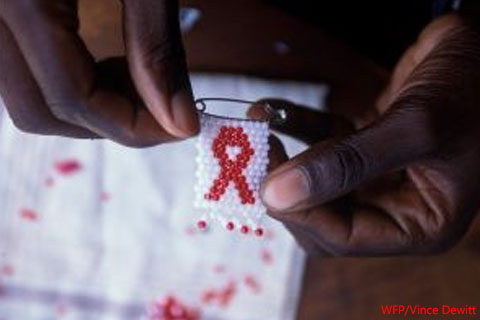In line with commemoration of World AIDS Day, the United Nations World Food Programme (WFP) renews it commitment and joins the world in spreading awareness about HIV/AIDS. Since to 2006, WFP partners with UNAIDS, the UN agency that focuses on the programs that involves HIV/AIDS. Together as UNAIDS focuses on the anti-retroviral treatment (ART) and retention in ART therapy, WFP helps governments integrate food and nutrition into their health programs and to build broad safety nets that protect livelihoods.
As of 2011, WFP assisted more than 2.2 million people impacted by HIV/AIDS in 38 countries worldwide. They are working in three areas first is the care and treatment that ensures nutritional recovery and treatment success through food and nutrition support. The immune system of a person living with HIV (PLHIV) it will affect their system not fully response to the treatment. The WFP supports nutritional recovery as part of the HIV comprehensive treatment package. Package includes nutrition assessment, education and counseling for all patients and nutritious food for malnourished patients during the first six months of treatment. Education and counseling allow people living with HIV to learn more about nutrition and healthy lifestyles.

The second is the mitigation and safety nets that will help lessen the socio-economic effects of HIV on individuals and households. Like the food for work program of WFP, the mitigation and safety program that falls on the category of HIV. The organization provides food assistance for temporary relief during the acute stage of disease for people receiving treatment. This assistance helps reduce food insecurity, encourages patients to access services and eases the burden of care on households and communities; it also supports orphans and vulnerable children. People living with HIV may participate in livelihood promotion activities, like urban gardening, carried out by WFP partners.
The partnership with UNAIDS also includes the involvement of the UN Human Rights Commission (UNHCR) that is responsible for humanitarian emergencies. Areas that this program is implemented include southern and eastern Africa particularly in countries like Zimbabwe, Mozambique, and Ethiopia. Other countries like Haiti and Afghanistan also implements this program with WFP and the rest of other 38 countries worldwide.
WFP as their renew their commitment they join the world and UNAIDS together with other 10 co-sponsors in getting zero: Zero new HIV infections, Zero discrimination and Zero AIDS-related deaths.


